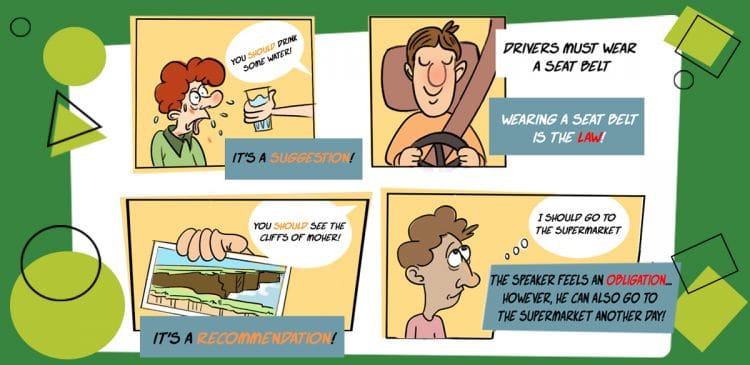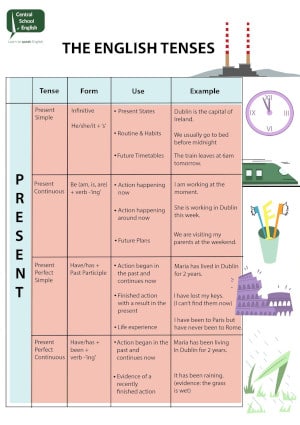Must and Should

I’m so tired! I should go to bed early tonight. However, I really must finish writing this blog. So here I am, burning the midnight oil to help you on your journey to speaking perfect English!
Did I hear you say “Thank you”? Don’t mention it. In this blog we’ll take a look at some of the ways we use the modal verbs must and should.
Modals verbs are a very important part of the English language both in speaking and writing. Knowing how to use all the modal verbs correctly will take some time, but it will be worth the effort when people say “Wow! your English is amazeballs!”
Modal Verbs - Form
There are ten modal verbs in the English language – can, could, may, might, must, will, would, shall, should and ought. Modal verbs are always followed by a main verb in the infinitive form.
After ought we use to + infinitive.
After all the other modal verbs we use the infinitive without ‘to’.
Look at these examples:
Joe can ride his bicycle very well.
Maria could speak when she was two years old.
I might watch a movie later.
We ought to help them clean the house.
I would go out if I had some money.
Must and Should - Positive Statements
To form a positive statement using must or should we use the structure modal + infinitive without ‘to’
I must go. I should go.
You must go. You should go.
He must go. He should go.
She must go. She should go.
It must go. It should go.
We must go. We should go.
You must go. You should go.
They must go. They should go.
Must and Should - Negative Statements
To form a negative statement using must or should we use the structure modal + not + infinitive without ‘to’
I must not go. I should not go.
You must not go. You should not go.
He must not go. He should not go.
She must not go. She should not go.
It must not go. It should not go.
We must not go. We should not go.
You must not go. You should not go.
They must not go. They should not go.
Must and Should - Questions
To form a question using must or should we use the structure modal + subject + infinitive without ‘to’
Must I go? Should I go?
Must you go? Should you go?
Must he go? Should he go?
Must she go? Should she go?
Must it go? Should it go?
Must we go? Should we go?
Must you go? Should you go?
Must they go? Should they go?
Must and Should - giving advice and recommendations
In English, we use the modal verb should when we want to give advice or make recommendations. For example: If your friend says ‘I have a headache’ you can give them some advice. You might say:
You should take an aspirin.
You should drink some water.
You should lie down and rest.
If your friend has a job interview you might say:
You should wear some nice clothes.
You should arrive on time.
You shouldn’t be late.
If you want to recommend some films or books to a classmate you might say:
You should watch The Shinning.
You should read Harry Potter in English.
You should see The Matrix in the cinema.
In English, we sometimes use the modal verb must to make a recommendation. However, when we use must in this way we are making a stronger recommendation than if we use should. For example:
You must see the film–it is amazing!!
You must visit the Cliffs of Moher–they are beautiful!!
You must try Irish coffee–it is delicious!
Must - giving advice to ourselves
We sometimes use must to give advice to ourselves (normally when someone else is listening!).
For example, we might say:
I must call John tomorrow.
In this sentence I am telling myself that calling John tomorrow would be a good thing to do. We only use must in this way when talking to ourselves in the first person.
We also use must in this way in the first person plural form. For example:
We must remember to buy a Christmas tree on Saturday.
We do not use must in this way for the other persons – you, he, she, it, they.
We do not say:
You must call John tomorrow.
He must buy a new car soon.
In these examples it is natural to use should instead of must:
You should call John tomorrow.
He should buy a new car soon.
Test Yourself
Must and Should - expressing obligation
We also use the modal verbs should and must to communicate an obligation. However, there is a small difference in meaning between the modal verbs should and must to communicate an obligation.
Should – we have an alternative
When we use should to indicate an obligation, it suggests there is an alternative to doing an action.
When we use must to communicate an obligation, there is no alternative.
For example:
We may say,
I should pay my phone bill today.
In this sentence, the speaker has an obligation to pay their phone bill. However, the speaker also has the alternative of paying the bill tomorrow or next week.
If we say:
I should go to the supermarket.
means that the speaker feels an obligation to go to the supermarket. However, the speaker also has the alternative of going to the super market at a later time.
If we say:
People should recycle their rubbish.
it means that recycling is the right thing to do. However, there is no law to say that people have to recycle. People have an alternative.
If we say
People should vote in elections.
it means that people have an obligation to vote in elections. Voting in elections is the right thing to do. However, using the modal verb should in this sentence means that people have an alternative.
Must – we have no alternative
When we use the modal verb must, we communicate that the person has no alternative. We often use must in written English to communicate obligation in the form of laws or rules.
For example, in a list of laws about driving we could state:
Drivers must wear a seat belt.
In this sentence we use must because drivers do not have an alternative, wearing a seat belt is the law.
In the airport we might see a sign that states:
All passengers must show their passport before boarding.
In this sentence we use the must because airplane passengers do not have an alternative, having a passport is the law.
We might read in a government document:
Workers must pay taxes to the state.
In this sentence, we use must because workers do not have an alternative, paying taxes is the law of the state.
When we state these rules and laws in spoken English, we generally use have to not must.
For example:
Drivers have to wear a seat belt.
You have to show your passport before boarding a plane.
Workers have to pay taxes to the state.
Test Yourself
Vocabulary
Don’t mention it: A common response when someone says ‘Thank you!’
Amazeballs: A modern slang word meaning ‘amazing’
Idioms
Burning the midnight oil: to stay up late working on a project or task Example: We have to finish the project this week, so we’ll be burning the midnight oil until we finish it.
Thank you for reading our post. You’ll find more English grammar tips elsewhere on our site and if you’d like information on our English courses in Dublin, please do not hesitate to contact us.





